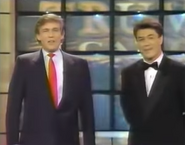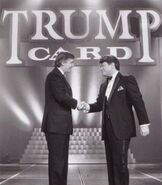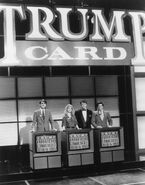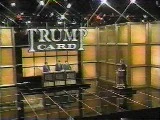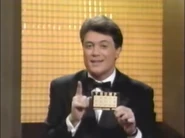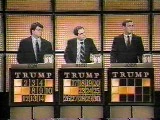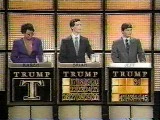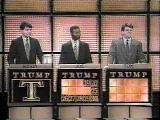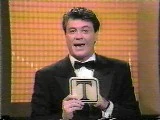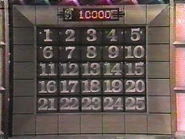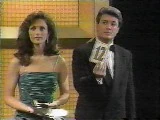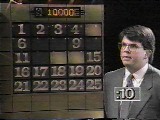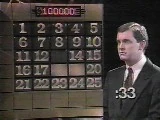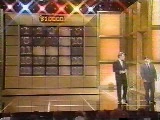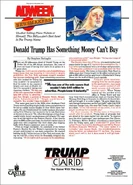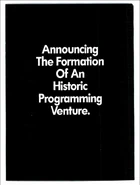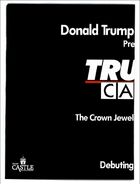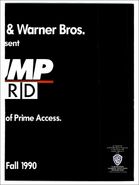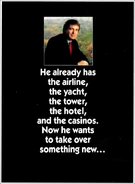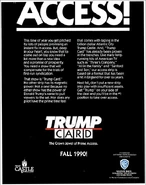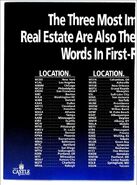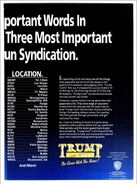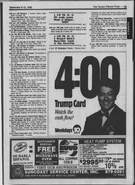| Host | |
| Jimmy Cefalo | |
| Hostess | |
| Debi Massey | |
| Announcer | |
| Chuck Reilly | |
| Broadcast | |
| Pilot: 12/6/1989 Syndication (Daily): 9/10/1990 – 8/23/1991 (reruns aired until 9/6/1991) | |
| Packagers | |
| Createl Limited Fiedler-Berlin Productions Telepictures | |
| Distributor | |
| Warner Bros. Television | |
"From the spectacular Trump Castle in world famous Atlantic City, it's time to play (the $100,000 championship on) television's non-stop game of knowledge…TRUMP CARD! And now, here's the star of Trump Card, Jimmy Cefalo!"
Trump Card was a year-old game show where three contestants answered questions to fill-up their own bingo-like cards. This was an adaptation of the British game show Bob's Full House. Keep in mind that this should not be confused with the 2020 political documentary film of the same name.
Gameplay
The object of the game was to mark off numbers on their bingo card, or in this case, their "Trump Card".
Main Game
Each contestant was equipped with a Trump Card with 15 numbers on them. Player #1's card had numbers 1-15, Player #2's card had numbers 16-30, and Player #3's card had numbers 31-45. Their job was to fill-up their Trump Card by answering general knowledge questions. Their cards were displayed on their monitors in front of them, while the home viewers saw them superimposed.
Round 1
In this round, the players competed to cover all four corners of their cards by answering questions from four different categories, each of which had four questions. One player would choose a category, then a question from that category was asked. The first player to buzz in had a chance to answer. A correct answer covered a corner number on the card, and earned the right to choose another category, but an incorrect answer locked that player out of the next question. This was indicated by the uncovered numbers blacked out on the card. Whenever that happened, the next question came from the next category in line.
The first player to cover all four corner numbers won $750.
Round 2
The object of this round was to complete the entire center line. This time there were four new categories, each with five questions. Before the round started, each player was given a very special Trump Card, which was a single card marked with a "T". At any point during the rest of the game, one player could use that Trump Card to stop another player's progress (this was classified as getting another player "Trumped"). A player could only play his/her Trump Card after giving a correct answer. As soon as the card was played, the player who was "Trumped" had a "T" marked in front of his/her podium in place of his/her Trump Card. To get out of being trumped, that trumped player had to answer one question correctly, though there was a ½ second delay in buzzing in.
The first player to complete his/her center line won $1,500.
Round 3
In this round, all three players competed to fill-up their entire Trump Card (mark off the rest of the numbers). Jimmy classified this as a "Flash Round." This time, there were no categories in this round; all questions were general knowledge. If any of the players hadn't used their Trump Cards yet, they were carried over into this round. The first player to fill-up his/her Trump Card won the game. If time was up before that happened, the closest non-trumped player to doing so received the money; but if the game ended in a tie, a series of tiebreaker questions were asked for the win. The winner of the game received an additional $3,000, plus a chance to play the Trump Card bonus round for $10,000.
The way the payoffs were structured & offered, one player could win up to $5,250. Any contestant who does not win any money in the front game left with consolation prizes.
Trump Card Bonus
This bonus game had similarities to the bonus rounds from other game shows, Blockbusters’ Gold Rush/Run, The Super Jeopardy bonus from the 1978 revival of Jeopardy!, Catch Phrase’s Bonus Game, and Wordplay’s Double Definitions Round.
The winning contestant faced a giant 25 numbered square game board. The object of the bonus was to get five-in-a-row in any direction, either across, up & down, or diagonally in 45 seconds or less. To start, the winning contestant pulled a Trump Card from a deck of 25 numbered cards, and the number chosen was immediately covered on the board, in other words it acted as a free space. Should the player win the game without using the special Trump Card, he/she won a bonus trump card choice/bonus free space. Now the player had 45 seconds to get five-in-a-row by answering questions correctly. The winner picked off numbers, and heard questions posed by host Cefalo on each number. A correct answer covered the chosen number, but an incorrect answer or a pass put a block up, and the contestant had to work his/her way around it/start a new route. If the winning player could make a line of five-in-a-row before time ran out, he/she won $10,000. If the winning contestant won with a hat trick in the main game and won the bonus, that player could win a maximum of $15,250.
Audience Game
During the show, members of the studio audience were each given their own Trump Cards of 15 numbers. Whenever a question was answered correctly, the audience members marked off their corresponding numbers. Meeting the requirements in each round was worth $10, so each audience member could win up to $30.
On the reverse side, there was another board of nine numbers that was used for the bonus game. Should the on-stage contestant's free number match the audience member's number on their card, they won an additional half of their winnings (ex: from $30 to $45), but if the on-stage contestant kept their Trump Card and selected a second free number which also matched the audience member's number, the audience member's cash was doubled (ex: from $30 to $60). As the on-stage contestant correctly answered questions, audience members marked off the corresponding numbers on their cards. If the audience member was able to mark off three numbers in a row, their total winnings were doubled, for a maximum total of $120.
$100,000 Tournament of Champions
Toward the end of the show's run, the 21 Bonus Round winners with the best records on cash accumulated and/or time it took to win the Bonus Round were invited back to play for $100,000. The following changes were made for the tournament:
- Seven preliminary matches were played and each game was played for a flat $3,000, as there were no bonuses awarded for the first two rounds. The end game was still played for an additional $10,000. Of the seven preliminary winners, the one with the best records received an automatic place in the finals. The other six played two semifinal matches to fill the remaining spots.
- In the final match, the two losing contestants received $2,500 and the winner of the tournament received $10,000. To win the full $100,000, the contestant had to play the bonus round one final time except this time, the winner gets to pick one of three question packets before the round began. Successfully getting the line within 60 seconds multiplied the winning contestant's $10,000 by 10 for a grand total of $100,000; however, the $100,000 bonus was not won.
Rating
Music
Score Productions
Inventor
Based on the British game show Bob's Full House by Terry Mardell and David Moore.
Studio
Trump Castle (later called Trump Marina, now called Golden Nugget Atlantic City), Atlantic City, NJ
Stations
Stations that aired this included:
- New York - WCBS (the station aired the show at 9:00 AM until about January 1991 when it got moved to late night at about 1:30 AM)
- Los Angeles - KCAL
- Chicago - WBBM
- Philadelphia - WCAU (which dropped it after 4 and a half months on the air in favor of The $100,000 Pyramid on 1/28/1991)
- San Francisco - KRON (the station aired it at 4:30 pm to start with, but after about two months, it got moved to about 10:30 am, and then finally at 4:30 am)
- Boston - WBZ (the station aired the show at 10:30 AM until about March 1991 when it got moved to late night at about 3:00 AM)
- Houston - KPRC (which dropped it after four months on the air in favor of the first half of Live with Regis and Kathie Lee on 1/7/1991)
- Dallas/Fort Worth - KXAS (which dropped it after four months on the air in favor of The $100,000 Pyramid on 1/7/1991)
- Denver - KUSA
- Phoenix - KPNX
- Minneapolis - KARE
- Miami - WCIX (the station yanked it from its 4:30 p.m. time slot after two months to 2:55 a.m. and replaced it with the second half of Star Trek: The Next Generation)
- Orlando - WOFL
- San Diego - KGTV
- Cincinnati - WKRC (the station aired the show at 10:00 AM until about January 1991 when it got moved to late night at about 12:30 AM)
- Sacramento - KOVR
- Seattle - KIRO (the station aired it at 7:00 pm to start with, but after about four months, it got moved to about 7:30 pm, and then finally at 1:10 am)
- St. Louis - KMOV (ratings doubled when they yanked it from its 6:30 p.m. time slot after four weeks to 2 a.m. and replaced it with reruns of Love Connection)
- Cleveland - WKYC (the station yanked it from its 12 noon time slot after seventeen weeks to 5:00 a.m. and replaced it with reruns of Love Connection)
- Pittsburgh - WPXI
- Indianapolis - WTTV
- Baltimore - WBAL
- Kansas City - WDAF
- Milwaukee - WITI (Then-CBS affiliate, now Fox) dropped Trump from its 6:30 p.m. prime access slot after five weeks and returned Entertainment Tonight to the time period)
- Norfolk - WVEC
- Dayton - WRGT
- Rochester, NY - WHEC (which dropped it after twenty six weeks on the air on 3/8/1991 in favor of the first half of Geraldo Rivera's talk show)
- Des Moines - KCCI (which dropped it after four months on the air in favor of The People's Court on 1/7/1991)
- Cedar Rapids - KDUB
- Madison - WMTV
- Wausau - WJFW
- La Crosse - WLAX
- Eau Claire - WEUX
- Honolulu - KHON
- Louisville - WHAS (which dropped it after eighteen weeks on the air in favor of the second half of The Joan Rivers Show on 1/7/1991)
- Austin, TX - KVUE
- South Bend - WSJV
- Albany, NY - WNYT
- Tucson - KGUN
- Mobile, AL - WALA
- Detroit - WJBK (which dropped it after twenty six weeks on the air on 3/8/1991)
- Grand Rapids - WOTV
- Albuquerque - KOAT
- Harrisburg - WHTM (which dropped it after four months on the air in favor of The People's Court on 1/7/1991)
- Hartford - WTIC (Ratings also doubled, when they replaced it after three weeks with reruns of the first half of Star Trek: The Next Generation at 7 p.m.)
- New Orleans - WVUE
- Salt Lake City - KSL
- Montgomery, AL - WHOA
- Amarillo - KFDA
- Columbus, OH - WSYX (the station yanked it from its 10 a.m. time slot after seventeen weeks to 2:00 a.m.)
- Memphis - WLMT
- Washington, D.C. - WJLA (which dropped it after sixteen weeks on the air in favor of the second half of The Joan Rivers Show on 12/24/1990)
- Raleigh - WRAL
- Portland, ME - WMTW
- Tampa - WTSP (the station yanked it from its 4 p.m. time slot after twelve weeks to 1:00 a.m. on 12/3/1990)
- Portland - KOIN
- Charlotte - WJZY
- Asheville - WLOS
- San Antonio - KENS
- Providence - WLNE
- Wilkes-Barre - WYOU
- West Palm Beach - WPBF
- Green Bay - WLUK
- Flint - WEYI
- Toledo - WTOL
- Shreveport - KTBS
- Fresno - KSEE
- Wichita - KAKE
- Syracuse - WIXT (now WSYR)
- Springfield, MO - KOLR
- Atlanta - WAGA (the station yanked it from its 10:30 a.m. time slot from Sept 10, 1990 to Jan 7, 1991 to 2:30 a.m. and replaced it with the first half of Magnum P.I. reruns)
- Tri-Cities - WEMT
- Las Vegas - KTNV (the station yanked it from its 7:30 p.m. time slot after seven weeks to 1:30 a.m. and replaced it with Family Feud)
- Lincoln - KHGI
- Waco, TX - KCEN
- Fort Myers - WEVU
- El Paso - KCIK
- Springfield, MA - WGGB
- Fargo - KTHI (now KVLY)
- Monterey - KCBA
- Santa Barbara - KEYT
- Fort Smith - KPOM
- Eugene - KEZI
- Beaumont - KFDM
- Wichita Falls - KSWO
- Boise - KIVI
- Odessa, TX - KTPX
- Lubbock - KJTV
- Bangor - WVII
- Abilene, TX - KRBC
- Palm Springs - KMIR
- Billings - KOUS
- Eureka - KVIQ
- Butte - KCTZ
- San Angelo - KACB
- Brunswick, GA - WBSG
- Lake Charles, LA - KVHP
- Tallahassee - WTWC
- Rockford - WTVO
- Johnstown - WATM
- Quad Cities - KLJB
- Terre Haute, IN - WBAK (now WAWV)
- Columbia, SC - WIS
- Anchorage - KIMO
- Fairbanks - KATN
- Juneau - KJUD
- Cheyenne - KGWN
- Chattanooga - WRCB
- Savannah, GA - WTGS
- Colorado Springs - KRDO
- Nashville - WXMT (now WXUP)
- Elmira, NY - WENY
- Fort Wayne - WFFT
- Jacksonville, FL - WJKS
- Wilmington, NC - WJKA (now WSFX)
- Bakersfield - KBAK
- Great Falls, MT - KRTV
- Traverse City - WGKI
- Garden City, KS - KUPK
- Colby, KS - KLBY
- Knoxville - WVLT
- Bluefield, WV - WVVA
- Charleston, WV - WSAZ
- Greenwood, MS - WABG
Trivia
- The pilot was taped at NBC Burbank. Tapings for the series began July 13, 1990.
- Former Feud host the late Richard Dawson once auditioned to host this show before it went to Cefalo.
- Donald Trump himself made an appearance on the premiere episode.
International Versions
The following are a list of countries that have previously aired their versions of Trump Card including:
- Finland
- Germany
- Greece
- Portugal
- United Kingdom (Country that originated the program as Bob's Full House)
Gallery
Press Photos
Screenshots
Trade Ads
Additional Page
Links
Rules for Trump Card
Trump Card Rules @ Loogslair.net
The Trump Card Fan Page @ Classicgameshows.com
The Trump Card Fan Page @ tv-gameshows.com (archived)
Canceled Too Soon: The Game - Trump Card (1990 - 1991)
YouTube Videos
A Reconstruction of the Full Theme
An Extended Version of the Opening Theme


